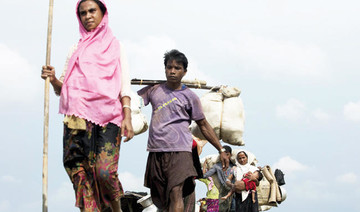BUDAPEST: Hungarian Prime Minister Viktor Orban travels to Florida on Friday to meet his “good friend” former US president Donald Trump, the shoo-in for the 2024 Republican presidential nomination.
Orban has frequently expressed hope for Trump’s return to power, insisting it would improve bilateral relations and enhance security in Europe — unlike most of his EU colleagues, who fear the exact opposite.
“It is not gambling at all, but the only sane approach for Hungary is to bank on the return of president Donald Trump,” he said earlier this week in an address to the Hungarian Chamber of Commerce and Industry.
Hungary’s nationalist premier was the only EU leader to endorse the real-estate mogul’s campaign during the 2016 US presidential election, later betting on his re-election in 2020 and publicly heaping praise on him ever since.
Trump has applauded Orban during his recent campaign speeches as a “strong leader,” although he misidentified him as the “leader of Turkiye” once.
Following US media reports on the upcoming meeting between the two politicians, Hungary confirmed it would take place on Friday.
Although the exact agenda is unknown, the meeting at the tycoon’s luxurious Mar-a-Lago residence is aimed at “further strengthening the diplomatic and strategic ties between Hungary and the United States,” Zoltan Kovacs, a government spokesperson, wrote on X.
Ukraine is expected to feature prominently in the discussions as both politicians oppose sending military aid to help the war-torn country defend itself against Russia’s ongoing offensive.
Hungary is the only EU member that has maintained close ties with the Kremlin following the Russian invasion of Ukraine.
Orban regularly advocates for immediate ceasefire and peace talks, arguing the former US president is best qualified to find a way out of the conflict.
Orban is not known to have scheduled talks with any officials of the current US government, as relations between the two countries have been frosty since Joe Biden’s inauguration in 2021.
The United States frequently criticized the Hungarian government for its close relations with Russia, holding up Sweden’s NATO bid and democratic backsliding.
Washington also canceled a bilateral tax treaty and rolled back a visa waiver program.
Meanwhile, Orban listed the Biden administration as one of his adversaries last year according to a report by the pro-government Magyar Nemzet daily newspaper.
In an August interview with conservative TV commentator Tucker Carlson, the Hungarian leader seemingly agreed with the suggestion that US taxpayers’ money had been used to fund a six-party opposition alliance’s 2022 election campaign to oust him.
Shunned by many of his Western colleagues, Orban is seen cultivating ties with many prominent right-wing politicians, anticipating their eventual electoral breakthrough.
This April, Budapest will host another offshoot of the Conservative Political Action Conference (CPAC) — an event linked to the US Republican Party — for the third straight year.
During the past two years, Trump sent short pre-recorded videos to greet attendees of the gathering.
At the last CPAC Hungary, Orban denounced the “progressive virus” propagated by “Western liberals,” boasting that he had the “serum” for it in his country.


























